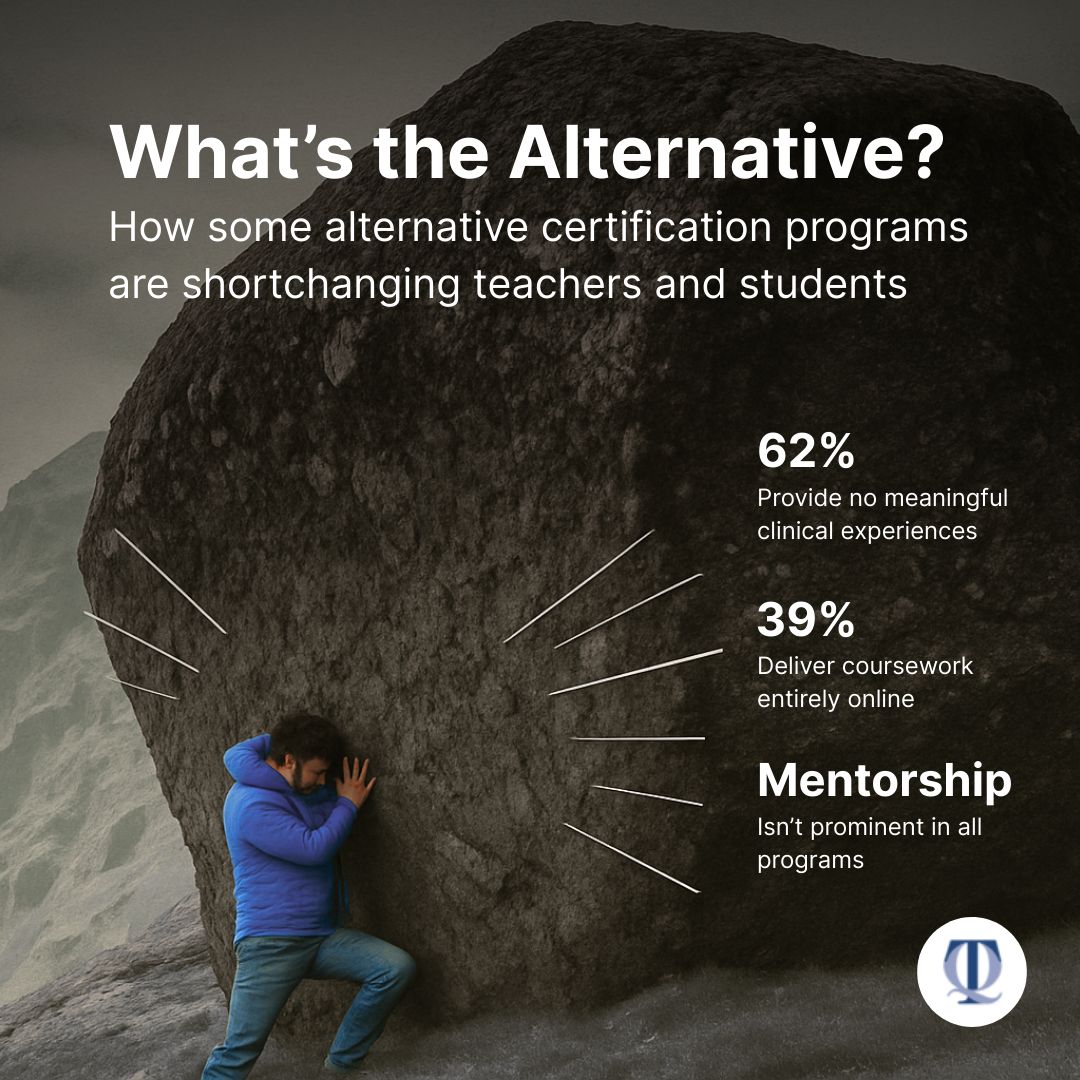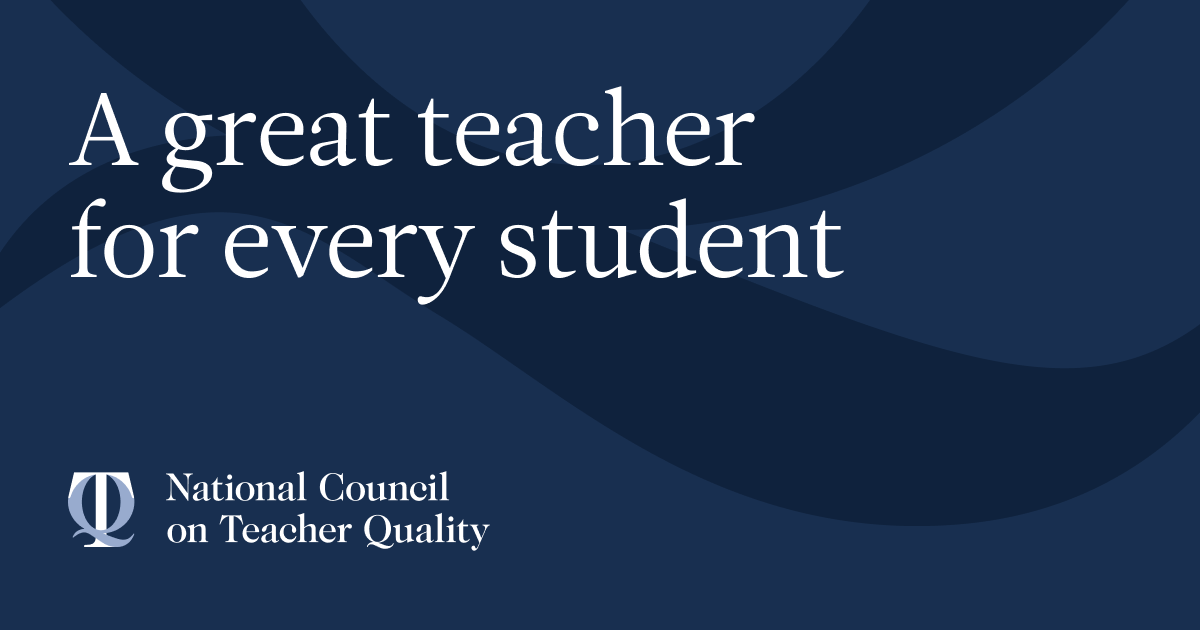
NCTQ
@NCTQ
The National Council on Teacher Quality is a nonpartisan research and advocacy group committed to ensuring that every child has an effective teacher.
Policymakers may feel like Sisyphus—forever pushing to fill teacher vacancies in hard-to-staff subjects and schools. Alternative certification offers hope, but many programs fall short, and some may make matters worse. We talk about it in our new brief: buff.ly/RAtKGho

Alt. cert. program enrollment is up 63% since 2010—but completions haven’t kept pace. Thousands start, but few finish. Our brief shows how states can plug this pipeline leak by holding programs accountable for helping candidates earn certification. buff.ly/RAtKGho

Only 13 states require aspiring elementary teachers to pass a solid math test. @NCTQ’s new report shows how low the bar is—and which states are doing better. Ali Schalop breaks it down. fordhaminstitute.org/national/comme…
Stay ahead of the curve on teacher quality research and policy issues! Our monthly newsletters deliver actionable insights to advocates, policymakers, researchers, and teacher prep faculty, straight to your inbox. buff.ly/yvfQGP3

Alternative certification can lessen teacher shortages in hard-to-staff roles—or make them worse. Our analysis of 550+ elementary alt. programs highlights the design features that separate the strong alt. programs from the weak ones. buff.ly/AXQODc3

Months of expert review work distilled into an easy resource for teacher prep programs. Oh, and it’s free.
Finding quality reading instructional materials shouldn't be a guessing game. That's why we review teacher prep resources against reading science—so programs can focus on teaching the right content instead of hunting down the right materials. buff.ly/TTHpb7Q
Only 16% of undergrad and 2% of grad teacher prep programs cover elementary math well—and most states use weak or unacceptable math licensure tests. No wonder students struggle with math when their teachers aren’t set up for success. buff.ly/IhBrV6P

Washington pays the highest teacher salaries in the country, but you wouldn’t guess that based on student achievement. Advocates there say NCTQ’s recommendations to improve teacher prep and pay based on performance are the right path forward 👏 buff.ly/6J4qFfe

🔥 Future teachers: Before choosing a College of Ed, check the @NCTQ ratings. Why? Because schools are finally prioritizing the science of reading. Districts want grads who can teach kids to read—on day one. SoR knowledge is a strategic advantage. Don’t play catch-up later—pick…
Finding quality reading instructional materials shouldn't be a guessing game. That's why we review teacher prep resources against reading science—so programs can focus on teaching the right content instead of hunting down the right materials. buff.ly/TTHpb7Q

Strong mentorship is a crucial factor in teacher preparation, yet 45% of fast-track elementary alternative programs offer no clear mentorship requirements. New teachers need support from effective mentors, not sink-or-swim experiences. buff.ly/RAtKGho

Many candidates in alt. programs receive only online coursework, often while serving as a teacher of record. This approach leads to higher turnover & lower student achievement. Wondering how else to prioritize quality in alt. programs? Check out our brief: buff.ly/RAtKGho

Texas enrolls 67% of all non-university alternative teacher candidates in the country, but the number of completers has declined by 21% since 2010. Fewer candidates finishing suggests the system is broken. We know a path forward for sustainable pipelines. buff.ly/RAtKGho

"Alternative" doesn't mean "worse"—but too many alt. programs deliver weak preparation. We examined data on 550+ elementary alt. cert. programs to see how they stack up against research-backed standards & found many fall short, hurting teachers & students. buff.ly/RAtKGho

Strong clinical practice (or student teaching) is key to effective prep, yet 62% of elementary alt. cert. programs send candidates into classrooms without it. New teachers who have strong clinical experiences led by an effective mentor are better prepared! buff.ly/RAtKGho

More large school districts are providing teachers with paid parental leave, but most of them (57%) still don't. Paid family leave is an important policy on a human level, but research shows it could also help districts retain teachers. buff.ly/yhVIYvV

Smart districts are realizing that providing paid parental leave for teachers may pay for itself. Considering the costs of teacher turnover and its impact on student outcomes, offering this benefit could be a more cost-effective approach. buff.ly/yhVIYvV

Teacher apprenticeships are exploding, and their success hinges on strong mentorship. @RTI_Intl's new report breaks down five critical design considerations that make a program strong: mentor selection, training, roles, compensation, and support. buff.ly/C6sFHqH
Research confirms: longer commutes for teachers = higher turnover, more absences, and lower performance. When housing costs skyrocket 47-51% but teacher salaries only rise 24%, teachers get pushed farther from schools—and students pay the price. buff.ly/AM2YUvp

I appreciated this question @karenvaites – so much so that I asked my colleague at NCTQ @RonNobleJr to write a more detailed article answering it. nctq.org/research-insig…
We see this question a lot. Is there one good write up that explains what teachers are learning when they are not being introduced to learning science and foundational literacy? @MissyPurcell @right2readproj @rpondiscio @HeatherPeske @KJWinEducation @Veggievangelist